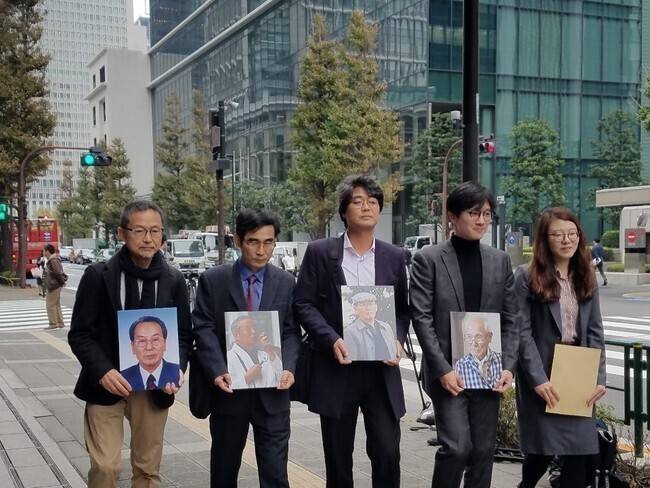hankyoreh
Links to other country sites 다른 나라 사이트 링크
[Column] Can Korea’s forced labor victims expect a sincere gesture from Japan?


Negotiations between South Korea and Japan over the issue of compensation for Koreans who were forced to labor during the Japanese colonial period appear to have entered the final stage.
The framework of the agreement is for Korea’s Foundation for Victims of Forced Mobilization by Imperial Japan to use its funds to compensate the victims instead of the Japanese companies that forced the Koreans to work, while Japan is expected to respond by making a “sincere gesture,” including participation in the fund by Japanese companies.
The main step that Japan is considering is having the chief Cabinet secretary, the spokesperson for the Japanese government, hold a press conference to repeat Japan’s intention to uphold earlier statements about its past colonial aggression.
Some of the statements frequently mentioned in the Japanese media are the 1995 Murayama Statement, which voiced an apology for Japan’s earlier colonial rule and wars of aggression, and the 1998 Korea-Japan joint declaration of partnership, which contained another apology for Japan’s colonial rule.
In effect, the Japanese government only means to repeat its support for earlier statements on the grounds that the question of compensation for forced labor was already addressed by a 1965 agreement that was supposed to settle outstanding claims between Korea and Japan.
But since the Murayama Statement was a sweeping apology for Japan’s colonial rule, it can’t be regarded as a direct apology to victims of forced labor. Besides, no Japanese Cabinet has ever refused to uphold that statement.
Japanese media outlets report that the Japanese government is mulling the option of endorsing those statements once again as a way of showing “consideration” for the Korean government.
Another step the Japanese government might consider is relaxing its export controls on Korea.
But the Japanese government has maintained that those controls are unrelated to the Korean Supreme Court’s order that the victims of forced labor be compensated. That was what Economy and Trade Minister Hiroshige Seko asserted when the Japanese cabinet decided on Aug. 2, 2019, to remove Korea from the “whitelist” of countries that enjoy streamlined procedures for exports of “strategic” parts and materials.
“In all respects, our reevaluation of our approach is based on the inadequacy of South Korea’s management and handling of exports of strategic materials. This measure doesn’t affect, and was not intended to affect, Japan-Korea relations, nor was it taken in response to anything,” Seko said.
In subsequent deliberations held by Korea’s Ministry of Trade, Industry and Energy and its Japanese counterpart, Japan consistently maintained that weaknesses in Korea’s export management — including insufficient regulations and staff for handling materials that can be applied to conventional weapons — were the reason for the export controls.
And since the export controls were something new imposed by Japan, removing them would do nothing to redress the harm caused by forced labor.
Who exactly ought to be making a “sincere gesture”? The Japanese companies that forced Koreans to provide labor, of course. Perhaps the best known are Nippon Steel and Mitsubishi Heavy Industries, the companies ordered by the Korean Supreme Court to compensate the forced labor victims.
But those two companies have flatly refused to even meet with Korean attorneys and Japanese aid groups.
In November 2018, shortly after the Supreme Court’s decision, attorneys and activists from Korean and Japanese civic groups tried to visit the office of Nippon Steel in Marunouchi, Tokyo, carrying photos of the victims. But the company refused to even meet with them and shooed them away with employees from a security subcontractor.
“This is an issue between our two countries. I hope they will resolve it without upsetting things,” said Eiji Hashimoto, president of Nippon Steel, at the end of 2022, when asked by the Japanese press about the forced labor issue.
Mitsubishi Heavy Industries has also claimed that the issue “was already resolved by the Japan-Korea claims agreement.”
These companies are hinting that they don’t mean to contribute to the fund for the victims, and the Japanese government’s current stance is that it won’t allow Japanese corporate defendants to do so.
If the Korean government agrees to this plan, it would be impossible to represent this as Japan making a “sincere gesture.”
Please direct questions or comments to [english@hani.co.kr]

Editorial・opinion
![[Editorial] Does Yoon think the Korean public is wrong? [Editorial] Does Yoon think the Korean public is wrong?](https://flexible.img.hani.co.kr/flexible/normal/500/300/imgdb/original/2024/0417/8517133419684774.jpg) [Editorial] Does Yoon think the Korean public is wrong?
[Editorial] Does Yoon think the Korean public is wrong?![[Editorial] As it bolsters its alliance with US, Japan must be accountable for past [Editorial] As it bolsters its alliance with US, Japan must be accountable for past](https://flexible.img.hani.co.kr/flexible/normal/500/300/imgdb/original/2024/0417/6817133413968321.jpg) [Editorial] As it bolsters its alliance with US, Japan must be accountable for past
[Editorial] As it bolsters its alliance with US, Japan must be accountable for past- [Guest essay] Amending the Constitution is Yoon’s key to leaving office in public’s good graces
- [Editorial] 10 years on, lessons of Sewol tragedy must never be forgotten
- [Column] A death blow to Korea’s prosecutor politics
- [Correspondent’s column] The US and the end of Japanese pacifism
- [Guest essay] How Korea turned its trainee doctors into monsters
- [Guest essay] As someone who helped forge Seoul-Moscow ties, their status today troubles me
- [Editorial] Koreans sent a loud and clear message to Yoon
- [Column] In Korea’s midterm elections, it’s time for accountability
Most viewed articles
- 1‘Right direction’: After judgment day from voters, Yoon shrugs off calls for change
- 2[Editorial] Does Yoon think the Korean public is wrong?
- 3Where Sewol sank 10 years ago, a sea of tears as parents mourn lost children
- 4Samsung barricades office as unionized workers strike for better conditions
- 5[Column] The clock is ticking for Korea’s first lady
- 6Strong dollar isn’t all that’s pushing won exchange rate into to 1,400 range
- 7Korea, Japan jointly vow response to FX volatility as currencies tumble
- 8Faith in the power of memory: Why these teens carry yellow ribbons for Sewol
- 9Japan officially says compensation of Korean forced laborers isn’t its responsibility
- 10[Guest essay] Amending the Constitution is Yoon’s key to leaving office in public’s good graces